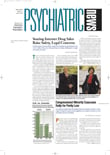When it comes to combating HIV infection, being of a socially inhibited temperament may well be a handicap.
So suggests a study conducted by Steve Cole, Ph.D., an assistant professor of medicine at the University of California at Los Angeles, and coworkers and in press with Biological Psychiatry.
Cole and his group found that HIV-infected gay men who are socially inhibited have eight times more HIV virus in their bodies than HIV-infected gay men who are not socially inhibited.
Cole and his team also found that socially inhibited HIV-infected gay men have more active autonomic nervous systems (fight-or-flight responses) than do HIV-infected gay men who are not socially inhibited. Thus, it’s conceivable that more aroused fight-or-flight responses might impair the ability of socially inhibited persons to fight HIV, Cole told Psychiatric News.
For the study, Cole and his colleagues recruited 54 homosexual men who were from the Los Angeles area and had been HIV positive for at least six months. Structured, validated psychological measurements were used to assess the subjects’ personalities and learn whether they possessed socially inhibited temperaments. The subjects were also evaluated for the amount of HIV virus in their blood; the levels of CD4 cells and T cells in their blood; use of highly active antiretroviral therapy (HAART), and autonomic nervous system activity. Twelve to 18 months later, the subjects were again measured for blood levels of HIV virus and of CD4 cells and T cells.
The researchers then looked to see whether those subjects who had scored high on social inhibition at the start of the study had any different HIV viral levels at this time than the subjects who had not scored high on social inhibition. The answer was yes. The former had some eight times higher HIV viral levels than the latter did, even when duration of HIV infection, use of HAART, and some other possibly confounding factors were taken into consideration.
The investigators then looked to see whether there were any differences in autonomic nervous system activity between socially inhibited and nonsocially inhibited subjects. (Autonomic nervous activity was measured via skin conductance, brachial artery systolic blood pressure, and EKG interbeat intervals.) Activity was found to be significantly higher in the former group, even while taking possibly distorting factors into consideration. Complex statistical analyses also suggested that most of the relationship between social inhbition and increased HIV disease activity could be attributed to differences in autonomic nervous system activity.
Finally, the scientists found that socially inhibited subjects responded differently to HAART than those who were not socially inhibited. Blood levels of HIV virus declined some eight times less in the former than in the latter, even when the amount of HIV virus in the blood at the start of the study, duration of HAART use, and some other possibly distorting factors were considered. What’s more, following use of HAART, socially inhibited subjects showed a significantly poorer CD4 cell and T cell recovery than nonsocially inhibited subjects did.
Thus, it looks as though, in the fight against HIV, having a socially inhibited temperament is a handicap, possibly because socially inhibited persons have an overly excitable autonomic nervous system that makes them more vulnerable to HIV replication.
The findings are not all bad news, though, Cole and his coworkers pointed out in their study report. For instance, if some way could be found to subdue pharmacologically the overly active involuntary nervous systems of socially inhibited HIV-positive persons, it might help them combat HIV.
The study was funded by the National Institute for Allergy and Infectious Diseases, National Institute of Mental Health, UCLA AIDS Institute, Pendleton Foundation, Norman Cousins Center at UCLA, Veterans Administration Medical Research Foundation, and Roche Diagnostics.
An abstract of the study, “Psychological Risk Factors for HIV Pathogenesis: Mediation by the Autonomic Nervous System,” is posted on the Web at www-east.elsevier.com/bps/abstracts/26968abs.htm. ▪
